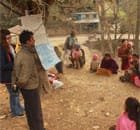A French volunteer Marie did campaigns on SODIS in VIN’s community. She did campaigns in a school and two communities. She trained 88 students from 7, 8 and 9 grade of Jitpur schools on water purification technique by SODIS. Again she trained same techniques to 22 community people from Devisthan and 17 people from Athmile.
Solar water disinfection is a type of portable water purification that uses solar energy to make biologically-contaminated (e.g. bacteria, viruses, protozoa and worms) water safe to drink. Water contaminated with non-biological agents such as toxic chemicals or heavy metals require additional steps to make the water safe to drink.SODIS is an effective method for treating water where fuel or cookers are unavailable or prohibitively expensive. Even where fuel is available, SODIS is a more economical and environmentally friendly option.
Process
- Colourless, transparent PET water or soda pop bottles (2 litre or smaller size) with few surface scratches are chosen for use. The labels are removed and the bottles are washed before the first use.
- Water from contaminated sources is filled into the bottles. To improve oxygen saturation, bottles can be filled three-quarters, shaken for 20 seconds (with the cap on), then filled completely and recapped. Very cloudy water with a turbidity higher than 30 NTU must be filtered prior to exposure to the sunlight.
- Filled bottles are then exposed to the sun. Bottles will heat faster and to higher temperatures if they are placed on a sloped sun-facing corrugated metal roof as compared to thatched roofs.
- The treated water can be consumed directly from the bottle or poured into clean drinking cups. The risk of re-contamination is minimized if the water is stored in the bottles. Refilling and storage in other containers increases the risk of contamination.
Local education in the use of SODIS is important to avoid confusion between PET and other bottle materials. Applying SODIS without proper assessment (or with false assessment) of existing hygienic practices & diarrhea incidence may not address other routes of infection. Community trainers must themselves be trained first.
Altogether 127 people were benefited from the training. People were excited with the technique which is more economic and time saving. It is planned to continue the campaign to other schools and communities.


 Member of
Member of
I know, its not quite on topic, but: Please dont forget to donate for Pakistan!!!! I just talked to somebody down there and the situation is really insane! We need to help those people because we are the ones whoc causes natural disasters with the green house effect! So please donate something, every cent helps! I just did the same